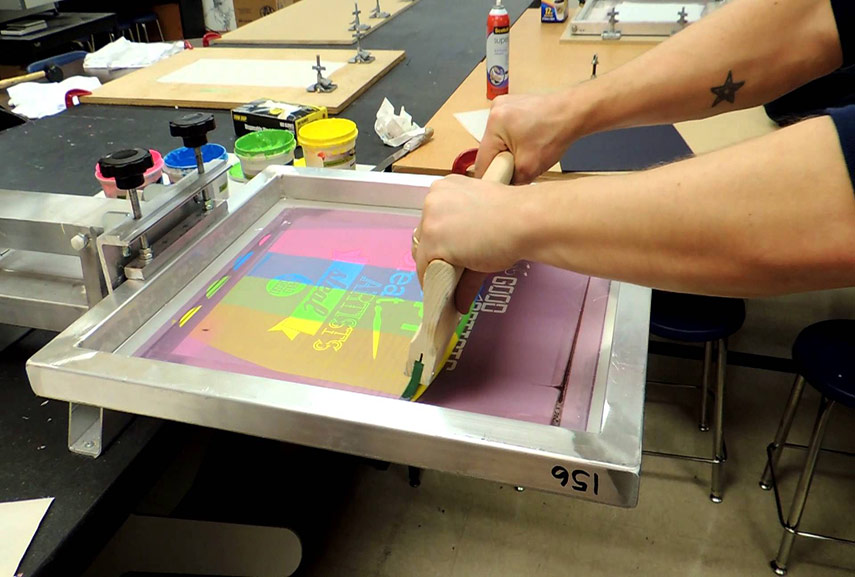ChatGPT said: How 10:9 Design Texas is redefining the screen printing industry
Wiki Article
The Necessary Guide to Understanding Screen Printing and Its Versatile Makes use of
Screen printing has a rich history that goes back to old times, developing right into an innovative strategy made use of across numerous industries today. This guide explores the details of the screen printing process, outlining its applications in home, fashion, and advertising decoration - 10:9 Design Screen Printing Texas. Comprehending these basics can open imaginative potential for both business and artistic projects. The complying with sections will certainly expose crucial pointers and techniques to improve one's screen printing venturesThe Background of Screen Printing
Although screen printing has roots that trace back centuries, its evolution shows the imaginative and technical improvements of various cultures. Originating in ancient China, the technique was originally made use of for embellishing fabrics and later spread to Japan, where it ended up being indispensable to Ukiyo-e woodblock printing. The technique moved to Europe in the 18th century, where it got popularity amongst craftsmens and industrial printers. The development of picture solution in the 20th century revolutionized screen printing, allowing for even more detailed layouts and higher efficiency. Musicians like Andy Warhol even more propelled its popularity, using the medium to develop renowned works that mixed commercialism and art. By the late 20th century, screen printing had actually developed itself as a flexible technique, utilized in fashion, advertising and marketing, and art. Today, it remains to develop, incorporating electronic innovation and broadening its applications throughout numerous sectors.The Screen Printing Process Explained
Screen printing changes artistic visions into concrete styles with a collection of exact steps. A picture is produced and after that moved onto a screen, commonly made of fine mesh material extended over a structure. A light-sensitive solution is related to the screen, which is exposed to light, solidifying in areas not covered by the image. After washing out the unhardened emulsion, a stencil is formed.Next off, the screen is placed over the substratum, whether it be textile, paper, or one more material. Ink is then pressed with the open locations of the stencil utilizing a squeegee, transferring the layout onto the substrate below. This process can be duplicated for several colors, needing separate screens for every hue. Lastly, the printed product is healed using warm to ensure the ink sticks properly, leading to a durable, lively layout on-line.
Kinds Of Screen Printing Techniques

Furthermore, specialty methods, such as discharge screen site web printing, remove color from the fabric to produce softer prints, while aluminum foil screen printing uses metallic aluminum foil to achieve a shiny coating (10:9 Design Texas). Each method offers distinctive characteristics, satisfying numerous creative requirements and production ranges, eventually broadening the possibilities within the screen printing domain
Applications of Screen Printing in Different Industries

In addition, the signage and marketing sectors use screen printing for creating captivating displays and banners. This technique permits for vibrant colors and elaborate layouts that record attention. In electronics, Homepage screen printing is used for using conductive inks to circuit boards, vital for part links. Moreover, the home style market accepts screen printing to create unique layouts on fabrics and wall surface art. On the whole, screen printing functions as a critical tool across diverse fields, boosting items with individualized and aesthetically enticing graphics.
Tips for Effective Screen Printing Projects
While taking on a screen printing task, mindful focus to information can considerably enhance the final outcome. First, selecting top quality products is vital; this includes the screen, inks, and substrates. Making use of ideal mesh matters can affect ink deposition and detail resolution. Prep work is similarly crucial; detailed cleansing of screens and correct exposure times ensure crisp prints.Next, exact registration is important for multi-color prints. Using alignment devices can aid attain exact layering. In addition, testing prints on scrap materials prior to production aids determine potential concerns without squandering resources.

Regularly Asked Concerns
What Products Are Finest for Screen Printing on Fabric?
Cotton and polyester blends are excellent for screen printing on fabric due to their longevity and ink absorption. Additionally, specialty materials like silk or canvas can generate unique appearances and coatings, enhancing the overall design high quality.Exactly how Do I Clean and Maintain Screen Printing Equipment?
To clean and keep screen printing equipment, one must frequently clean screens with suitable solvents, inspect squeegees for wear, lube moving components, and shop all products in a completely dry, dust-free atmosphere to lengthen their life-span.What Are the Environmental Effects of Screen Printing?
Screen printing can have substantial environmental effects, consisting of chemical waste from solvents and inks, water usage during cleansing processes, and energy intake. Sustainable practices and environmentally friendly products are crucial for decreasing these adverse view it now effects.Can Screen Printing Be Done at Home Successfully?
Screen printing can be successfully done at home with the right materials and techniques. Hobbyists can produce top quality prints, though success depends on their skill degree, devices, and understanding of the procedure entailed.
What Are the Prices Connected With Starting a Screen Printing Business?

Beginning a screen printing company entails costs for devices, materials, and office. Preliminary costs typically vary from a few hundred to numerous thousand bucks, depending upon the range, quality of equipment, and preferred manufacturing ability.
Screen printing has an abundant history that dates back to ancient times, advancing into a sophisticated strategy used throughout numerous sectors today. An additional method, rotary screen printing, utilizes round displays, promoting continual printing on fabric rolls, consequently improving efficiency for large-scale productions. Additionally, specialty techniques, such as discharge screen printing, remove dye from the textile to develop softer prints, while aluminum foil screen printing uses metal foil to accomplish a shiny surface. In the style industry, screen printing is extensively utilized to develop dynamic designs on apparel, enabling brands to display their one-of-a-kind designs. Cotton and polyester blends are excellent for screen printing on textile due to their longevity and ink absorption.
Report this wiki page